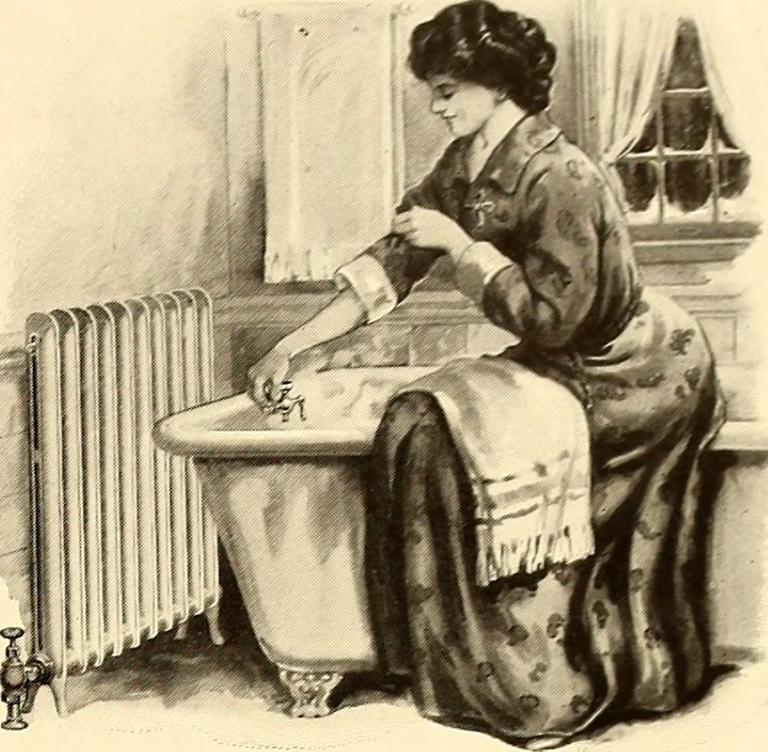Contrary to the common impression, the ancient world put a lot of emphasis on bathing and cleanliness, with the Romans going so far as to invent indoor plumbing. The Middle Ages also, with the encouragement of the Church, took a lot of baths, with population centers having public bathhouses. Not until the early Modern era through the Enlightenment of the 18th century did people get the idea that taking baths may be unhealthy. But in the late 19th century, society-reforming Protestants launched a major crusade to promote cleanliness, sometimes to the point of confusing it with Godliness.
Gershon draws on an article from the Journal of the American Academy of Religion, Allegories of Progress: Industrial Religion in the United States, by Richard J. Callahan, Kathryn Lofton, and Chad E. Seales, which studies the interrelationship of 19th century industrialism and religion.
She says that the phrase “cleanliness is next to Godliness” can be found in a 1778 sermon by John Wesley. But that concept would be taken literally by Christian activists who made bathing one of their socially-progressive causes and who allied themselves with the new soap companies. “Callahan, Lofton, and Seales explain how the push to sell soap depended on, and contributed to, a larger ideology,” she writes. “It brought together ideas of progress, the fight against prostitution and alcohol, and an optimistic, self-improving Protestant theology under the rubric of cleanliness.”
Ivory Soap, for example, took its name from Psalm 45:8: “All thy garments smell of myrrh, and aloes, and cassia, out of the ivory palaces, whereby they have made thee glad” (Psalm 45:8).
A manufacturer of facial soap started a “Facial Purity League,” with “campaign buttons and membership contracts describing in vivid Christian language the connection between soap and moral worth, between purchase and regeneration.” Another soap company promised to donate a penny for each wrapper turned in to the Women’s Christian Temperance Union.
The Cleanliness Institute, initiated by a soap industry organization, put out tracts, of the sort that Christians used for evangelism, including the Book About Baths, a 24 page explanation of the “correct methods for morning bathing, after-work baths, bathing for children, and baths of different temperatures.”
Though it sounds like the new mass-producing soap companies were drawing on religion to market their product, more than Christians taking the lead in pushing soap, the companies were obviously tapping into a strong Christian sentiment of the times. So we can credit our current penchant for cleanliness and personal hygiene as another example of the cultural influence of Christianity.
And yet, the kind of Christianity this movement was a part of was the Social Gospel of mainline Protestantism, which would replace the Gospel of personal salvation through Christ with a gospel of reforming society through progressive ideology. Yes, the 19th century Christian reformers, many of whom were evangelicals, did much good–opposing slavery, improving conditions in the slums, fighting child labor, educating poor children, etc.–as the transcendent element in their religion gave way to a completely this-worldly focus, the activists too often came across as self-righteous busybodies, full of moral zeal for issues that were not really moral (prohibition, cleanliness).
It is true that the Bible says much about washing and cleansing. The Church Fathers also taught that Christians should be clean physically. But the Biblical and theological testimony agrees that what we mostly need to be cleansed of is our sins.
“Purge me with hyssop” prays the repentant Psalmist, “and I shall be clean; wash me, and I shall be whiter than snow” (Psalm 51:7).
God cleanses us, washing away not the dirt from our bodies but the sin from our souls. “Cleanliness is next to Godliness” sets up two separate categories, exalting what Ivory soap can do for our bodies into a virtue secondary only to our piety. But in actual Christianity, true Godliness comes from an awareness that God cleanses us.
He does so through the life, death, and resurrection of Christ, and through the Holy Spirit, who brings us to faith. But all of that He brings to us physical human beings by means of a physical washing, the “washing of regeneration” that employs ordinary water joined to the Word of God:
But when the goodness and loving kindness of God our Savior appeared, he saved us, not because of works done by us in righteousness, but according to his own mercy, by the washing of regeneration and renewal of the Holy Spirit, whom he poured out on us richly through Jesus Christ our Savior. (Titus 3:4-6)
Baptism, which corresponds to this [God’s salvation of Noah through the water], now saves you, not as a removal of dirt from the body but as an appeal to God for a good conscience, through the resurrection of Jesus Christ. (1 Peter 3:21)
The Catechism explains:
How can water do such great things?
Certainly not just water, but the word of God in and with the water does these things, along with the faith which trusts this word of God in the water. For without God’s word the water is plain water and no Baptism. But with the word of God it is a Baptism, that is, a life-giving water, rich in grace, and a washing of the new birth in the Holy Spirit,
And yet, I daresay that The Cleanliness Institute and the Facial Purity League had little interest in this kind of washing.
Image from page 266 of “American homes and gardens” (1905). Caption: “Cleanliness is next to godliness,” but re- quires a well-warmed bath-room for its full enjoyment, for only the hardiest men or women can bathe in a cold bath-room with- out endangering health.” Via Flickr, Public Domain.
HT: Paul McCain














